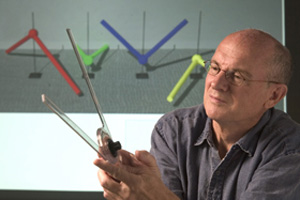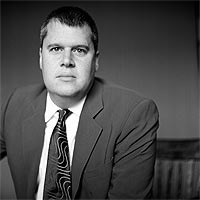Neuroscience, Lemony Snicket Talks Part of Snowdon Lecture Series
 Dale Purves, the George Barth Gellor Professor for Research in Neurobiology, and director of the Center for Cognitive Neuroscience at Duke University will speak on Why We See What We Do: Brightness and Color” as part of the upcoming Snowdon Lecture Series. (Photo courtesy of Duke University) Dale Purves, the George Barth Gellor Professor for Research in Neurobiology, and director of the Center for Cognitive Neuroscience at Duke University will speak on Why We See What We Do: Brightness and Color” as part of the upcoming Snowdon Lecture Series. (Photo courtesy of Duke University) |
| Posted 10/16/07 |
| Upcoming lectures funded by the Edward W. Snowdon Fund focus on childrens book writing, the way human beings perceive brightness and color, and cognitive behavior as it relates to stress and health.
For several years, the family of Edward W. Snowdon ’33 has supported a variety of programs through the Edward W. Snowdon Fund. Wesleyan is privileged to have special funds available to bring artists, musicians, dancers, writers, scientists, and other renowned people to campus, says Linda Secord, director of University Lectures and Alumni Programs. These campus visitors provide outside-the-classroom learning experiences that would not be possible without generous funding from supporters like the Snowdons. The upcoming speakers, co-sponsored by the Edward W. Snowdon Fund include:
Dale Purves, the George Barth Gellor Professor for Research in Neurobiology, and director of the Center for Cognitive Neuroscience at Duke University will speak on Why We See What We Do: Brightness and Color, at 8 p.m. Oct. 24 in Kerr Lecture Hall in Shanklin Laboratory. His talk is co-sponsored by the Departments of Biology, Molecular Biology and Biochemistry, and Psychology, the Neuroscience and Behavior Program and the Wesleyan Student Assembly. Purves will speak again on Why We See What We Do: Geometry and Form, at noon Oct. 25 in Exley Science Center Room 121. This talk is co-sponsored by the Biology Department. Robert Sapolsky, professor of biological sciences, professor of neurology and neurological sciences, from Stanford School of Medicine at Stanford University will speak on Stress and Health: From Molecules to Societies at 4:30 p.m. Nov. 14 in the Goldsmith Family Cinema. His talk is co-sponsored by the departments of Biology, Molecular Biology and Biochemistry and Psychology, the Neuroscience and Behavior Program and the Wesleyan Student Assembly. Additional upcoming lectures are posted online at http://www.wesleyan.edu/lectures/liberal.html. |
| By Olivia Drake, Wesleyan Connection editor |


 Daniel Handler 92, novelist, screenwriter, childrens book author, and musician will speak about childrens books at 8 p.m. Oct. 24 in Beckham Hall in Fayerweather Hall. Under the pen name of Lemony Snicket, Handler, who is pictured at right, is the author of the childrens books, A Series of Unfortunate Events. His talk is co-sponsored by English Department and Wesleyan Writing Program.
Daniel Handler 92, novelist, screenwriter, childrens book author, and musician will speak about childrens books at 8 p.m. Oct. 24 in Beckham Hall in Fayerweather Hall. Under the pen name of Lemony Snicket, Handler, who is pictured at right, is the author of the childrens books, A Series of Unfortunate Events. His talk is co-sponsored by English Department and Wesleyan Writing Program.